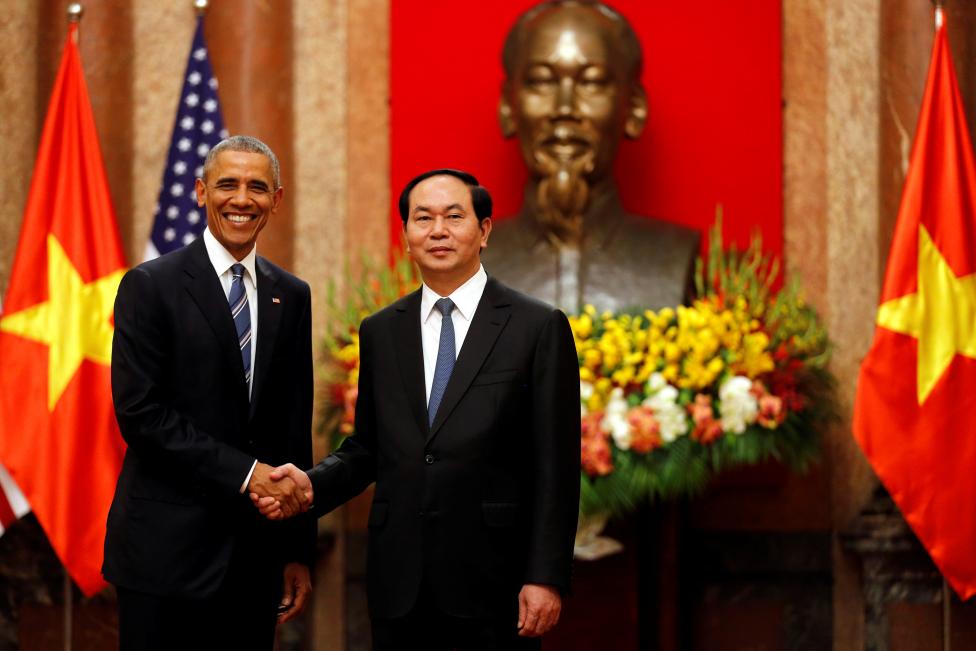U.S. President Barack Obama announced on Monday during his first visit to Vietnam that Washington will fully lift a half-century-old embargo on sales of lethal arms to the communist country, underlining warming relations between the former foes amid rising tensions with Beijing over the South China Sea.
At a lavish state luncheon in Hanoi, Vietnamese President Tran Dai Quang toasted Obama’s first visit to the country as the arrival of a warm spring after a cold winter.
Obama, the third U.S. president to visit Vietnam since ties were restored in 1995, has put a strategic ‘rebalance’ towards Asia-Pacific at the heart of his foreign policy.
Vietnam, where the United States was at war until 1975, has become a critical part of that strategy amid concerns about China’s growing military might and its sovereignty claims in the South China Sea.
The decision to lift the arms trade ban, which followed intense debate within the Obama administration, suggested that U.S. concerns about China’s assertiveness outweighed arguments that Vietnam had not done enough to improve its human rights record and that Washington would lose leverage for reforms.
Obama’s visit comes 41 years after the end of the Vietnam War in which the US sought to prevent a communist takeover of South Vietnam.
Several million Vietnamese – civilians, communist fighters and South Vietnamese soldiers – were killed, as well as more than 58,000 U.S. soldiers.
Obama announced the full removal of the embargo at a news conference where he indicated a desire to leave behind the troubled history between the countries and reward what he described as modest progress on human rights in the one-party state.
“At this stage, both sides have established a level of trust and cooperation, including between our militaries, that is reflective of common interests and mutual respect,” Obama said, adding that every U.S. arms sale would be reviewed case by case. “This change will ensure that Vietnam has access to the equipment it needs to defend itself and removes a lingering vestige of the Cold War.”
Obama stressed the importance of resolving disputes in the South China Sea peacefully and not by whoever “throws their weight around”. He insisted that the arms embargo move was not linked to China.
“The decision to lift the ban was not based on China or any other considerations, it’s based on our desire to complete what has been a lengthy process of moving towards normalization with Vietnam,” he said, adding later that his visit to a former foe showed “hearts can change and peace is possible”.
RENEWED TIES
Though the communist parties that run China and Vietnam officially have brotherly ties, China’s politics has forced Vietnam to recalibrate its defense strategy.
The lifting of the U.S. embargo will tighten the strategic pressure on China while deepening Vietnam’s relationship with the United States. It will also provide Vietnam with leverage in future arms deals with traditional weapons suppliers, particularly its long-time security patron, Russia.
While Vietnam has recently obtained submarines equipped with land-attack missiles, advanced air defense radars and state-of-the-art jet fighters from other nations, it was likely to seek advanced surveillance and intelligence systems from the United States, said Collin Koh, a military expert at Singapore’s S Rajaratnam School of International Studies.
“This is a really cutting-edge but niche field that will help Vietnam better integrate its various forces – and the U.S. can really help fill this gap,” Koh said.
Lifting the ban will likely upset China, which sees U.S. support for rival South China Sea claimants like Vietnam and the Philippines as interference and an attempt to establish hegemony in the region. Washington insists its priority is ensuring freedom of navigation and flight.
China’s foreign ministry said after the announcement in Hanoi that it hoped the development in relations between the United States and Vietnam would be beneficial to regional peace and stability.
Underlining the burgeoning commercial relationship between the United States and Vietnam, one of the first deals signed on Obama’s trip was an $11.3 billion order for 100 Boeing planes by low-cost airline VietJet.
China is Vietnam’s biggest trade partner and source of imports. But trade with the United States has swelled 10-fold over the past two decades to about $45 billion, and Vietnam is now Southeast Asia’s biggest exporter to America.
In the commercial hub, Ho Chi Minh City, formerly Saigon, Obama will on Tuesday meet entrepreneurs and tout a Trans-Pacific Partnership trade deal he has championed, in which Vietnam would be the biggest beneficiary of the 12 members.
